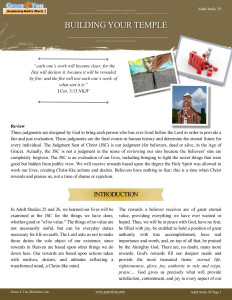
“each one’s work will become clear; for the Day will declare it, because it will be revealed by fire; and the fire will test each one’s work, of what sort it is.” I Cor. 3:13 NKJV
INTRODUCTION
In Adult Studies 25 and 26, we learned our lives will be examined at the JSC for the things we have done, whether good or “of no value.” The things of no value are not necessarily sinful, but can be everyday duties necessary for life on earth. The Lord asks us not to make those duties the sole object of our existence, since rewards in Heaven are based upon other things we do down here. Our rewards are based upon actions taken with motives, desires, and attitudes reflecting a transformed mind, a Christ-like mind.
The rewards a believer receives are of great eternal value, providing everything we have ever wanted or hoped. Thus, we will be at peace with God, have no fear, be filled with joy, be enabled to hold a position of great authority with true accomplishment, have real importance and worth, and, on top of all that, be praised by the Almighty God. There are, no doubt, many more rewards. God’s rewards fill our deepest needs and provide the most treasured items: eternal life, righteousness, glory, joy, authority to rule and reign, praise…. God gives us precisely what will provide satisfaction, contentment, and joy in every aspect of our eternal lives. When we compare our rewards with the Beatitudes (Matt. 5:3-11), and those promised in Isaiah (Isa. 61:3), we see they are much the same; the difference is that we will receive our rewards in Heaven, while Kingdom believers get them on the earth. The Kingdom saints have their rewards reserved in Heaven, to be brought back with Christ when He returns (Rev. 22:12).
We often view Heaven, our eternal home, as the place where we will play harps, enjoy loved ones, meet biblical saints, and mostly importantly, be with the Lord. Since the Kingdom saints have work to do on earth (being priest to the unsaved world), it seems consistent to believe we will have duties in Heaven. These will not be burdensome or distasteful duties, but specially designed to fit our character and provide lasting pleasure. We know we will judge the world and angels (1 Cor. 6:2-3), but exactly what that means is unclear. Certainly there are angels reserved for judgment (2 Pt. 2:4), but even if we are involved with their judgment, it is a onetime event. There is a heavenly sphere of angelic beings, so perhaps we will be involved in judging them over the course of eternity; not judging for sin, but for assuring direction, counsel….
Judging the world is undefined, so we wonder what is meant. If this were a reference to judging in the First Resurrection or Great White Throne, those are completed in short time (compared to eternity), so what else will we do? Reigning with Him (2 Tim. 2:12) is an ongoing activity of high value and importance, but what or whom will we be reigning over? Is it possible He will start a new creation on earth, have us involved in far away planets or galaxies, or reigning over angels? The mention of ages to come (Eph. 2:7) may imply there are new ages we know nothing about. Whatever He has planned, will, no doubt, excite each of us and create lasting joy.
We do know believers are rewarded differently—some more, some less—as each person’s works are tried and rewarded (1 Cor. 3:14-15). We do not know if these rewards result in eternal differences between individuals. Since the twelve Apostles will sit on twelve thrones judging Israel (Lk. 22:30), there are distinct roles and lines of authority in the earthly Kingdom; the same likely applies in Heaven. If so, the more rewarded individuals in Heaven may be given higher rank or responsibility as leaders, judges…. At the present time, there are ranks among the heavenly hosts (regular angels, archangels, cherubim); will that continue with us serving as judges (1 Cor. 6:2-3)? Since no discord, jealousy, or strife exists now among the heavenly hosts, we can be certain God has assured that well-being will continue when we arrive. No matter where we are or what we are doing, we will be happy and fulfilled as God uses us for His glory.
When we think of the eternal perspective, there are compelling reasons to do things now in order to gain rewards in Heaven. Thus, the goals of this study are:
- to help you know what is expected by God in this life (so you are not in the dark),
- to help you know the basis of rewards in Heaven (so you can make preparations), and
- to prepare you for the ultimate inspection (a building inspection, which you can easily pass).
BIBLE TRUTH
The Scripture uses an analogy of the believer’s life on earth represented by a temple. A temple in biblical times was the most sacred and valuable building possible. To God, the believer is the most valuable thing, said to be the temple of the indwelling Holy Spirit. “Do you not know that you are the temple of God and that the Spirit of God dwells in you?” (1 Cor. 3:16; see I Cor. 6:19). The temple being discussed is a personal temple, relating to the spiritual nature of our lives here on earth.1 The temple is spiritual; so, too, are the building materials use to construct it.
The Importance of the Foundation
The importance of the foundation for a temple in the first century (when Paul wrote) is important to understand. We are accustomed to thinking of a foundation as being made of continuous, reinforced concrete. However, a foundation for a temple in Paul’s day was a series of huge stone blocks, buried to some degree in the ground, undergirding the structure to ensure a uniform and solid support. When using stone blocks for a simple rectangular structure, there would be four cornerstones (see diagram below). Other foundations stones were laid between the cornerstones. There was only one chief cornerstone, the most important of all the foundation stones. The chief cornerstone was the first stone laid, as such, it determined the location of the temple, its orientation, elevation….
Paul speaks by analogy, with the physical foundation of a temple representing the foundational truths of Jesus Christ. Each of us is a temple (our lives) built upon the foundation of Christ, “…having been built on the foundation of the apostles and prophets, Jesus Christ Himself being the chief cornerstone, in whom the whole building being fitted together, grows into a holy temple in the Lord” (Eph. 2:20-21). The apostles and prophets Paul mentions are quite surely those mentioned later in Ephesians 4:11, that is, the apostles and prophets God raised up specifically for the work of the ministry and the edification of saints in the early Church (Eph. 4:11-12). These apostles and prophets helped establish the early church and are part of the foundation. For our temple, there is one foundation with one Chief Cornerstone, “For no other foundation can anyone lay than that which is laid, which is Jesus Christ” (1 Cor. 3:11). The foundation is based upon Christ, and we build upon Him; but we need to know what building materials to use.
The believer’s temple is built upon a sure, sound foundation. All buildings are totally dependent upon a firm and lasting foundation. The Apostle Paul was the master builder and laid the foundation for our temple, according to the grace given to Him by God, “According to the grace of God which was given to me, as a wise master builder I have laid the foundation, and another builds on it. But let each one take heed how he builds on it” (1 Cor. 3:10). The foundation itself is the Lord Jesus Christ, “For no other foundation can anyone lay that that which is laid, which is Jesus Christ” (1 Cor. 3:11). Paul taught about Jesus Christ according to what God had revealed to him. That teaching is the foundation; there is no other. If the foundation is not sound, the building cannot last or function properly. If the foundation is weak, building a good temple on it is impossible; thus, God had to have it laid for us. By doing so, He assured to us the possibility of building a lasting and correctly functioning temple. We build our lives upon this foundation; no surer foundation exists. However, our building can be of any quality based upon our choices, even though the foundation is the best. We have no excuse for not knowing about Jesus Christ and are given every opportunity to live correctly (i.e., to construct a good temple).
Building Your Temple
Our temple has a foundation already laid; now we build upon it with various building materials. We build the superstructure, the part above the foundation. Our building will one day be tried by fire, at the Judgment Seat of Christ. Our salvation is not tried: that is secure; but what we have built is tried. “Now if anyone builds on this foundation with gold, silver, precious stones, wood, hay, straw, each one’s work will become clear; for the Day will declare it, because it will be revealed by fire; and the fire will test each one’s work, or what sort it is. If anyone’s work which he has built on it endures, he will receive a reward. If anyone’s work is burned, he will suffer loss; but he himself will be saved, yet so as through fire” (1 Cor. 3:12-15). The foundation is sure; it will not be touched by fire. However, our temple (the part we build above the foundation) can go up in smoke, or survive the fire and endure forever. That which passes the “building inspection by fire” will have eternal value and is the basis or our rewards in Heaven. The Bible instructs us to conduct our lives (build our temple) in a way that our work withstands the ultimate trial. We need to know for sure, from the Bible, what will survive God’s testing by fire. The last thing we want to do is build with wood, hay, and straw (these have some value on earth, but not in Heaven).
1 At times, Paul indicates the entire body of believers is also a temple.
This is just a short excerpt. Use the links below to Read or Download the entire file:
New Lessons Coming Soon!
We add new lessons on a regular basis. Subscribe now to be the first to know when new lessons are available.

